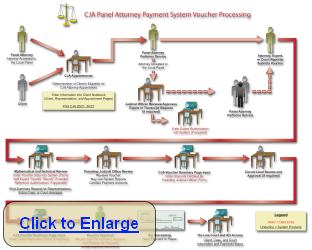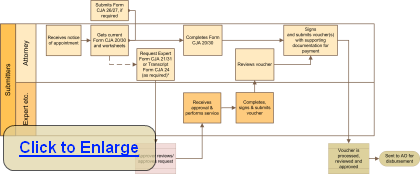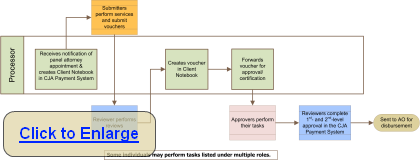The CJA Voucher Review and Approval Process involves many roles and functions. As depicted in the following high-level flowchart of the voucher submission, review, approval, and payment process, the CJA Panel Attorneys or other Submitters fill out voucher (claim) forms and submit them to the court or FDO for payment. Experts and other service providers, also considered Submitters, do the same with the assistance of the Panel Attorney and court personnel. The vouchers are reviewed at a variety of levels and forwarded electronically (after approval by the appropriate judicial authority) to the Administrative Office of the United States Courts (AO) for the payments to be disbursed.

The CJA Voucher Payment Process involves the following roles and functions:
A voucher claim is initiated by a Submitter. The person may be the appointed CJA Panel Attorney or other service provider, such as an expert, interpreter, or investigator.
The appointed panel attorneys fill out required forms and attach supporting documentation. See general forms. They provide an additional itemized statement of services rendered and expenses incurred, including the date and number of hours claimed for each service provided, by specified categories of activity, and the dates and descriptions of all expenses. If the claimed amount exceeds statutory maximums, the attorney includes an explanation as to why payment exceeding those amounts is necessary and appropriate.
A provider of services other than counsel completes a separate voucher, which is signed by appointed counsel (or retained counsel, as applicable) certifying that the services were rendered for the case, and the voucher is submitted to the court (or the FDO).
The Attorney should submit a request for advance authorization for investigative, expert, or other services where it is anticipated that such services will exceed the applicable statutory maximum. The sample request located in the Guide, Vol. 7, Appendix 3A may be used for this purpose.

Once the vouchers are submitted, they pass through several levels of review and processing before being approved. The roles involved in the various levels of review and approval include Processors, Reviewers, Approvers and, if necessary, Excess Approvers.
Processors may be employees of the court or the FDO. They enter the Panel Attorney's initial appointment data (or other service provider's authorization data) in the CJA Panel Attorney Payment System The Processor enters the amounts claimed in the CJA Panel Attorney Payment System. It is the Processor's responsibility to forward the voucher to others in the review process. Some Processors may also perform review functions.

Reviewers may be employees of the court or the FDO. Their main duties are to perform mathematical and technical reviews of submitted vouchers to make sure that all hours claimed are correctly calculated, all non-compensable services or non-reimbursable expenses are identified, and verify that all required supporting documentation is attached. The Reviewer forwards the voucher for approval. Upon certification/approval, the Reviewer enters the certified/approved amounts in the CJA Panel Attorney Payment System

Approvers may be judges or their authorized designees. The judge who presided over the case (or designee) reviews and evaluates the reasonableness of a Submitter's claim, approves or disapproves amounts for payment (within the levels of the person's delegation or statutory approval authority), and signs the voucher. For vouchers claiming amounts more than the statutory maximums, the presiding judge certifies the “excess” amounts that are authorized and appropriate, and the voucher is forwarded to the circuit for review and approval.

Excess Approvers are chief circuit judges or their designees. This level of approval is required if a submitted voucher claims compensation and/or reimbursement of expenses in excess of the statutory maximum allowance. Depending on circuit practices, a circuit Reviewer's observations may be forwarded to the Excess Approver. Excess Approvers consider the voucher and certification forwarded by the presiding judge (and the circuit Reviewer's observations, if any) and assess the reasonableness of the Submitter's claims prior to approving or disapproving the amounts and signing the voucher.
Notification of Proposed Reduction of CJA Attorney Voucher. To ensure basic procedural fairness, if the court determines that the CJA panel attorney's claim should be reduced, the court should provide the attorney with prior notice of the proposed reduction with a brief statement of the reason(s) for it, and an opportunity to address the matter (unless the proposed reduction is based on mathematical or technical errors). The court may conduct a hearing (although one is not required) to consider the attorney's response or may communicate informally with counsel about questions or concerns (in person, telephonically, or electronically). [Guide, Vol. 7, § 230.36]
CJA vouchers should not be delayed or reduced for the purpose of diminishing Defender Services program costs in response to adverse financial circumstances. [Guide, Vol. 7, § 230.33]
Approved vouchers are provided to court personnel for further processing.

To be paid under the CJA, the attorney must first be formally appointed by a court to provide representation for a financially eligible person. When that representation is completed, the CJA panel attorney and providers of other services in the representation must submit separate vouchers to the court, seeking compensation and reimbursement of expenses.
If the presiding judge determines that periodic or interim payments are necessary and appropriate for a specific case, vouchers may be filed prior to the completion of service. If interim payments are requested, the Submitter should provide a memo to the court indicating the length of time for which an interim payment will be needed and, if applicable, the amount of money requested for each interim payment. In addition, the memo should provide an explanation demonstrating the need for such interim payments. When submitting the voucher, the Requestor should attach the court order approving interim payments.
[Guide, Vol. 7, § 230.73] [Guide, Vol. 7, § 310.60]
Appointed Counsel. To request payment for compensation and expenses, appointed panel attorneys are required to:
If the total compensation claimed is in excess of the statutory case compensation maximum, counsel will submit with the voucher a detailed memorandum supporting and justifying counsel's claim that the representation given was in an extended or complex case, and that excess compensation is necessary to provide fair compensation. The Form CJA 26 (district court)/Form CJA 27 (court of appeals), Supplemental Information Statement for Compensation in Excess of the Statutory Case Compensation Maximum, may be used. [Guide, Vol. 7, § 230.30(b)]
Other Service Provider. A provider of services other than counsel - such as an expert, investigator, or interpreter - also completes a voucher (Form CJA 21/Form CJA 31). It must be signed by the appointed Panel Attorney, thereby certifying that the services were performed as claimed. The claim should include:
Transcripts. The preferred method for payment of transcripts authorized by the court is for the court reporter or reporting service to claim compensation directly (on a Form CJA 24). Alternatively, the Panel Attorney may pay the court reporter or reporting service and obtain reimbursement as an “out-of-pocket expense” using the Form CJA 24. [Guide, Vol. 7, § 320.30.10]
To prevent errors, prior to submitting vouchers, Submitters should verify current hourly rates, mileage rates, and all calculations; provide adequate documentation; and ensure there are no duplicate claims (e.g., payment for the same services or expenses claimed has not been requested by the Submitter on a CJA voucher in another CJA representation). Click here for current hourly compensation rates.
When a court or FDO receives a voucher, it is reviewed to verify the initial appointment data, amounts claimed for compensation and expense reimbursement, and for mathematical accuracy and technical sufficiency.
The mathematical review includes a careful re-calculation of all hours submitted by the panel attorney, making sure that all hours were submitted in the proper format; namely, in tenths of an hour.
The technical review includes verifying that all required supporting documentation is attached to the voucher. Depending on the case, this may include itemized receipts, phone bills, and timesheets. The reviewers also identify claims for possible noncompensable services or non-reimbursable expenses. These reviews are critical to the CJA voucher payment process. After they are completed, the voucher is provided, with the Reviewers' observations and recommendations, to the presiding judge or designee.
After preliminary reviews, all vouchers submitted for compensation require a judicial review. The judge who presided over the case (or authorized designee) reviews the “reasonableness” of the claim and approves payment within the levels of their delegated/statutory authority. If the court determines that the appointed CJA panel attorney's claim should be reduced, the court should provide appointed counsel with prior notice of the proposed reduction with a brief statement of the reason(s) for it, and an opportunity to address the matter (unless the proposed reduction is based on mathematical or technical errors). [Guide, Vol. 7, § 230.36]
For vouchers claiming amounts exceeding statutory maximums, after the presiding judge certifies that the “excess” amounts are authorized and appropriate the voucher must be forwarded to the chief circuit judge (or circuit judge delegate) for review and approval. Payments in excess of CJA compensation maximums may be made to provide fair compensation in cases involving extended or complex representation when so certified by the court and approved by the circuit approval authority. [Guide, Vol. 7, § 230.23.40(a)]
The approving judicial officer should first make a threshold determination as to whether the case is either extended or complex [Guide, Vol. 7, § 230.23.40(b)]. After establishing that a case is extended or complex, the approving judicial officer should determine if excess payment is necessary to provide fair compensation. [Guide, Vol. 7, § 230.23.40(c)]
Once vouchers are approved, the payment information is electronically submitted to the AO for processing and payment disbursement.